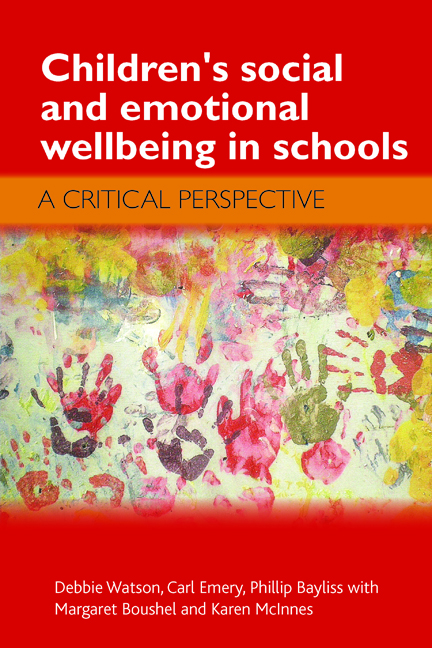Chapter 3 - Policy on the promotion of wellbeing in schools
Published online by Cambridge University Press: 01 September 2022
Summary
Introduction
This chapter critically reviews some key UK educational policies focused on the promotion of social and emotional wellbeing (SEWB) in schools over the last decade. We also offer some wider context to this policy formation and the drivers behind it. Each of the four countries of the UK is considered separately as there are different policy frameworks in each region. Table 3.1 shows estimated relative youth (under 18) populations across the UK as context for this discussion.
The rise and rise of wellbeing in education policy
Within education policy, wellbeing, and its offshoot SEWB, is a relatively new discourse, reflective of much of the New Labour agenda post-1997. What policymakers understand by wellbeing is far from clear (Ereaut and Whiting, 2008), as we outlined in Chapter 2.
Dartington Social Research Unit (Axford et al, 2009) identified five ‘lenses’ (needs, poverty, quality of life, social exclusion and children's rights) through which policymakers observed and acted on children's wellbeing and suggested that policymakers’ understanding of these lenses is inconsistent. The route policy has taken, however, does show consistency. Both in the UK and internationally it has favoured operationalised or Objective List Theory (OLT) definitions. UK examples of lists of wellbeing indicators integral to policy include Every Child Matters’ five outcomes, and the Scottish Curriculum for Excellence's four capacities.
The United Nations World Health Organization (WHO), the Organisation for Economic Co-operation and Development (OECD) and the United Nations Educational, Scientific and Cultural Organization (UNESCO) have all influenced UK policy on SEWB in schools. Several comparative international reports (UNICEF, 2007; Bradshaw and Richardson, 2009; OECD, 2009) suggested that UK children fare worse than their counterparts in many other countries surveyed.
The UNICEF report ranked the UK 21st out of 21 rich countries surveyed. The UNICEF report was based on a concept of wellbeing grounded in the United Nations Convention on the Rights of the Child (UNCRC), and this resulted in some difficult findings for the UK. Just over 40% of the UK's 11, 13 and 15 year olds found their peers kind and helpful, the worst score of all the developed countries. The UK had the highest proportion of young people who smoke, abuse drink and drugs, engage in risky sex, and become pregnant at too early an age. Also, 30% of the 15 to 19 year olds were not in education or training or were not looking beyond low-skilled work.
- Type
- Chapter
- Information
- Children's Social and Emotional Wellbeing in SchoolsA Critical Perspective, pp. 41 - 56Publisher: Bristol University PressPrint publication year: 2012



